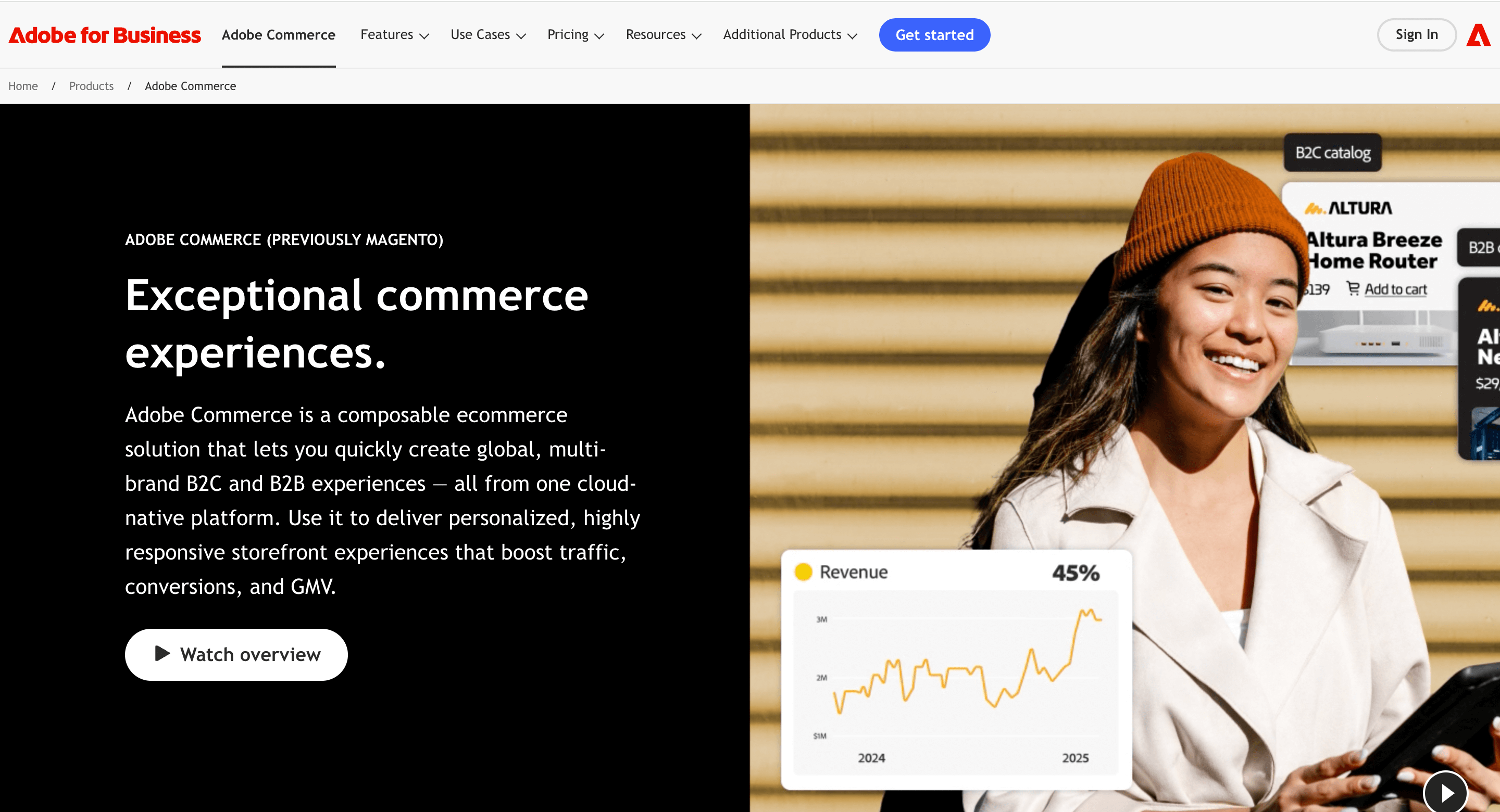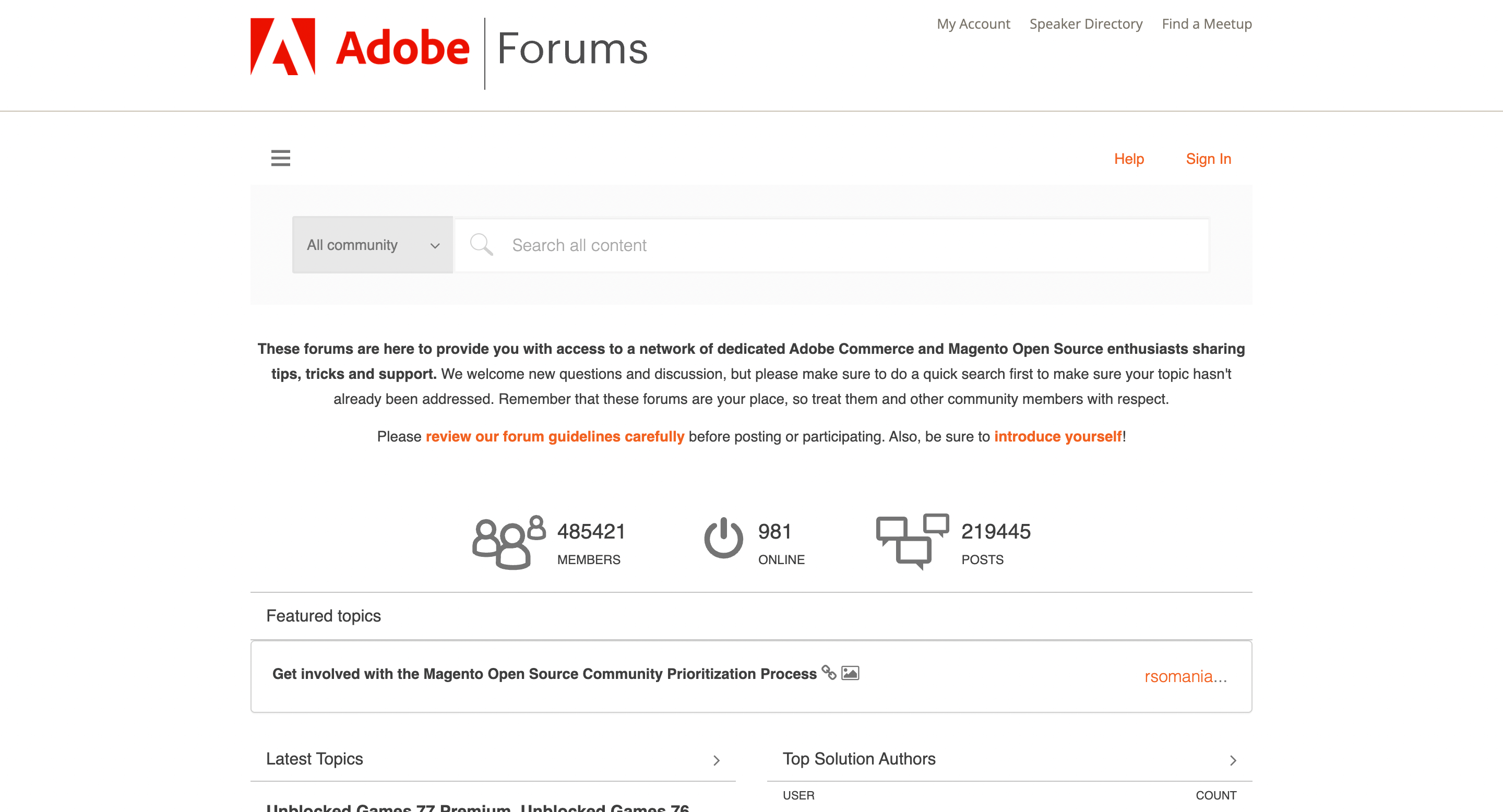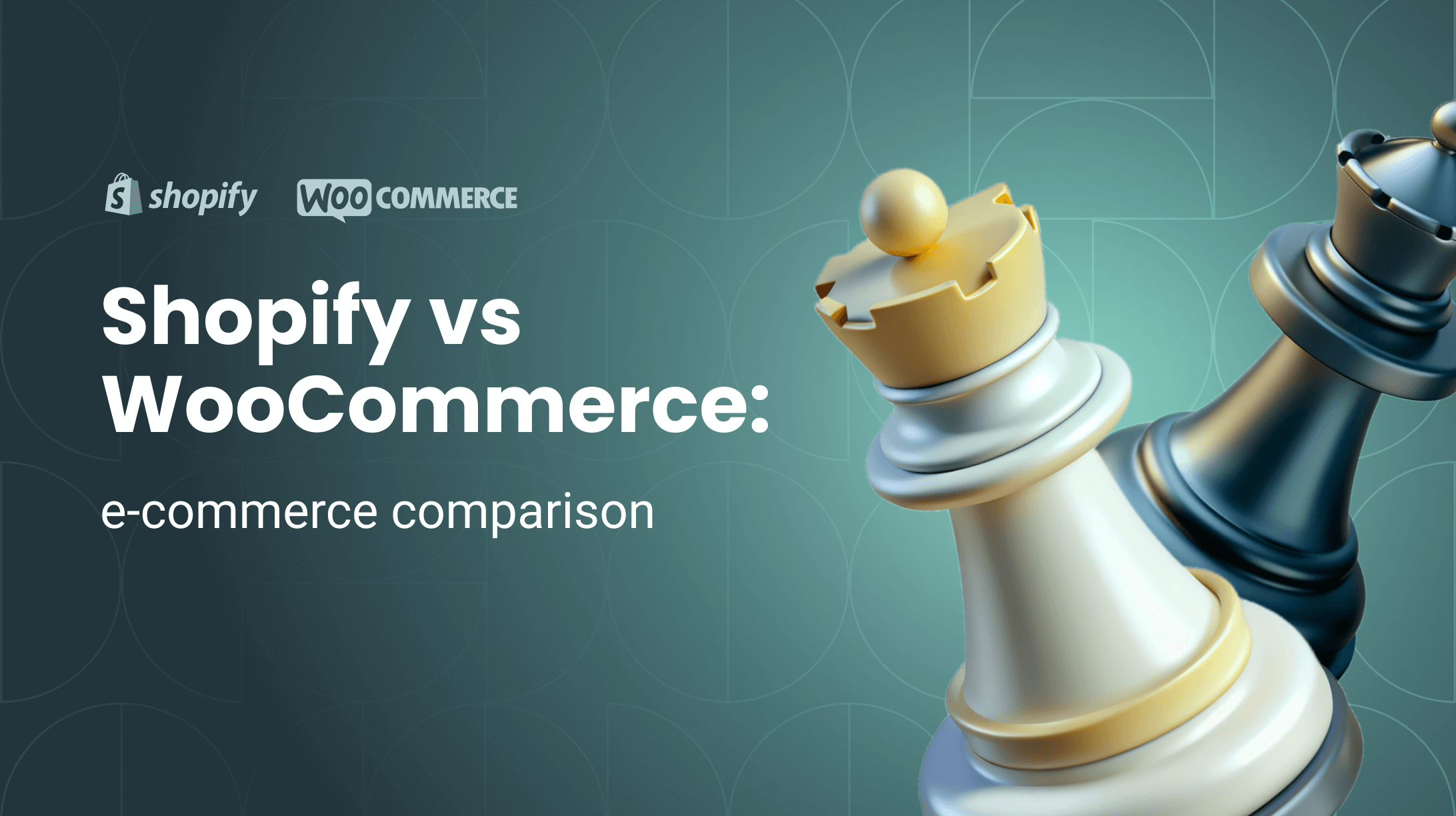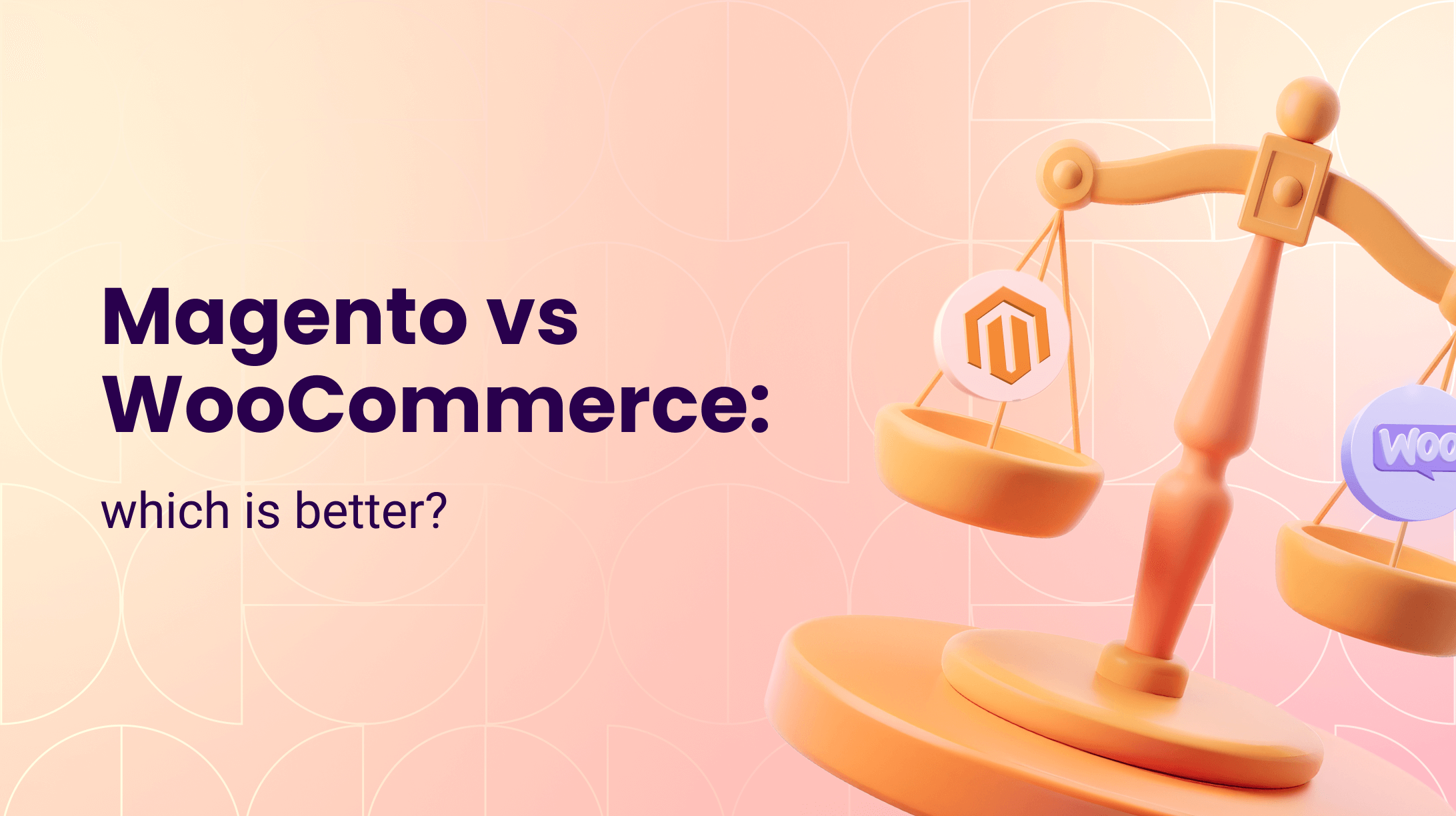0%
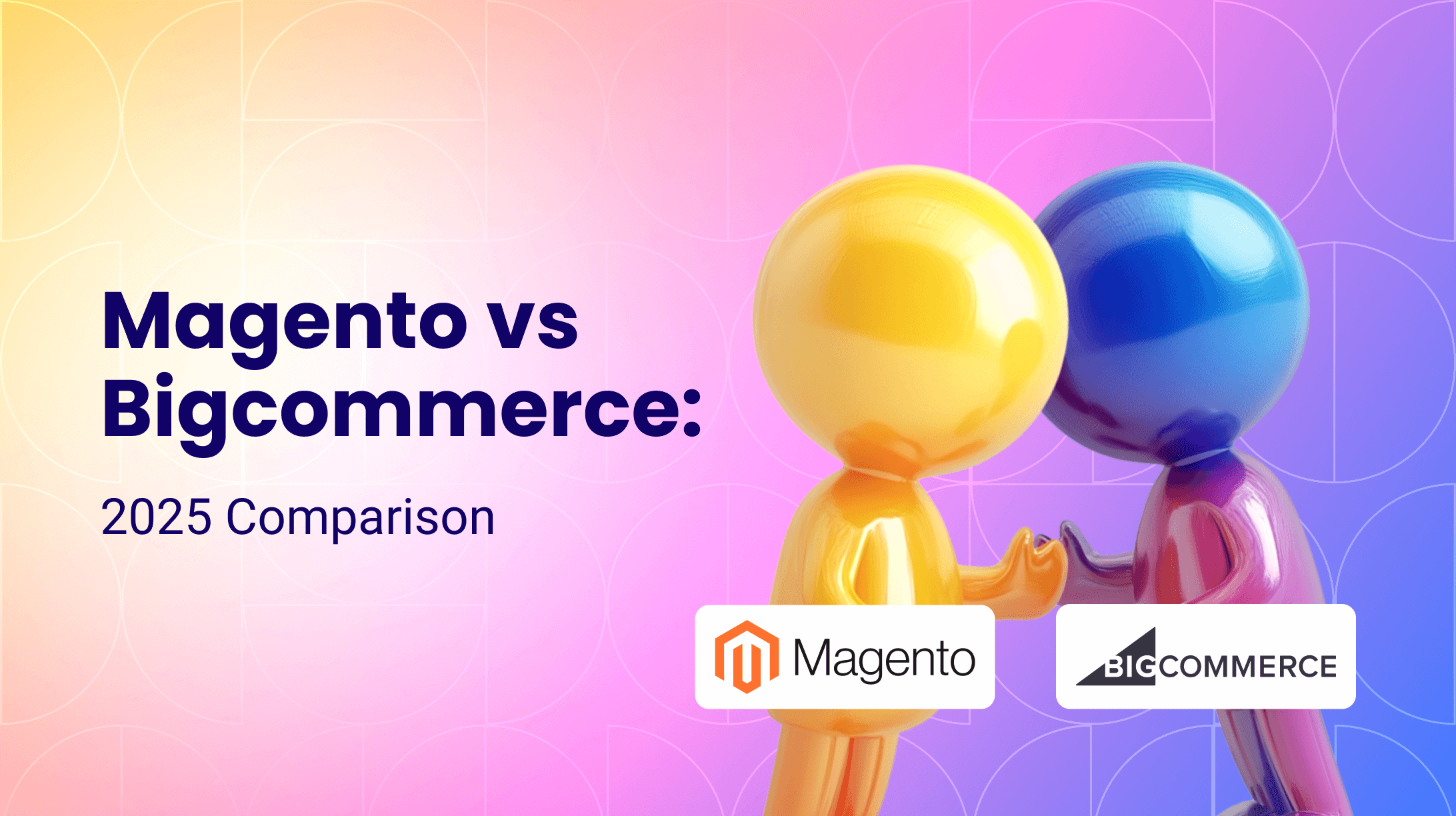
In This Article:
Magento (Adobe Commerce) Overview
BigCommerce Overview
Key Aspects For Choice: BigCommerce or Magento
BigCommerce vs. Adobe Commerce Pricing and ROI
Key Features Comparison: BigCommerce vs. Magento 2
Performance Metrics: BigCommerce vs. Magento Enterprise
SEO and Marketing Tools
Community and Support
Security Features
Customization
Scalability
According to Statista, global e-commerce sales will surpass $8 trillion by 2027, which shows significant growth and a shift towards digital marketplaces. This increase makes it crucial for businesses to choose the right e-commerce platform to remain competitive.
The platform you choose affects your ability to attract and keep customers and influences how efficiently your business operates. To stay in the game, you should find a solution that balances flexibility, scalability, and cost-effectiveness.
This article provides a detailed comparison of two popular e-commerce platforms: Magento and BigCommerce. It examines key features, pricing, scalability, and support options, and offers valuable insights to ensure your choice aligns with your business goals and growth strategy.
Magento (Adobe Commerce) Overview
Magento is a powerful e-commerce platform known for its flexibility and customization options. Trusted by numerous large enterprises worldwide, it provides robust features that allow businesses full control over their online stores. Magento is an especially great choice for large enterprises and companies with technical expertise.
For more insights on how Magento compares with another major platform, check out our detailed comparison with Shopify.
Pricing
Magento offers an open-source version that is free to use, but users must cover the hosting costs that typically range from $10 to $250 per month, depending on the hosting provider and plan. The Commerce version has licensing fees starting at approximately $22,000 per year, depending on the business's size and specific requirements.
For a comparison of how Magento's pricing stacks up against another popular option, see our Magento vs WooCommerce analysis.
Key Magento Features
- Customization and Flexibility: Extensive options to tailor the platform to specific business requirements.
- Scalability: Supports businesses of all sizes, from small startups to large enterprises with complex catalogs.
- SEO and Marketing Tools: Advanced tools to enhance search engine rankings and marketing efforts.
- Third-Party Integrations: Seamlessly connects with a variety of third-party applications and services.
- Community Support: A strong network of developers and resources to support ongoing improvements.
With its comprehensive customization abilities, Magento is ideal for businesses with unique workflows, custom product configurations, or multi-store setups. To see how Magento's flexibility compares to other platforms, explore our comparison with PrestaShop.
BigCommerce Overview
BigCommerce is a versatile platform known for its ease of use and advanced features that cater to businesses of all sizes. A fully hosted solution, it simplifies online store management by providing a user-friendly drag-and-drop interface, which requires no extensive technical skills.
Pricing
BigCommerce pricing plans start at $39 per month for the Standard plan, with a 15-day free trial available for new users to explore its capabilities. As BigCommerce’s pricing scales to accommodate business growth, additional features are available in the Plus and Pro plans ($105 and $399 per month, respectively).
Key BigCommerce Features
- No Transaction Fees: Sells without additional transaction costs, unlike many competitors.
- Built-in SEO Tools: Enhances online visibility with advanced search engine optimization.
- Scalability: Accommodates business growth with straightforward plan upgrades.
- App Integrations: Connects easily with a wide range of third-party apps and payment gateways.
- 24/7 Customer Support: Provides continuous support to resolve issues quickly.
BigCommerce is a great option for fast-growing businesses that want enterprise-level features without the overhead of managing infrastructure. Its built-in SEO tools, multi-channel selling capabilities, and lower maintenance needs make it especially appealing for lean teams focused on quick scalability.
Key Aspects For Choice: BigCommerce or Magento
When you compare Magento and BigCommerce, several important criteria can guide your decision process. Here are the key aspects to consider:
| Aspect | Magento | BigCommerce |
| Pricing and Costs | Open-source is free, with hosting ($15-$100/month). Commerce has high licensing fees (thousands annually), plus costs for extensions and support. | Plans start at $39/month with no transaction fees. Pricing scales based on your annual sales volume, so costs may increase as your revenue grows. |
| Customization vs. Built-in Features | Extensive customization options for tailored solutions. | Offers a wide range of built-in features. |
| Ease of Use | Requires a certain level of technical expertise for setup and maintenance. | User-friendly interface with straightforward setup, ideal for non-technical users. |
| SEO and Marketing Capabilities | Advanced SEO features and marketing tools for custom enhancements. | Strong built-in SEO tools with automatic optimization and customizable URLs. |
| Performance and Scalability | Highly scalable for large, complex stores; ideal for enterprises. | Designed for scalability with features for high-volume stores and advanced order management. |
| Customer Support and Resources | Extensive community and developer resources; support available but may require more technical knowledge. | 24/7 support with in-depth guidance and an extensive knowledge base for users. |
This table provides just a high-level comparison of Magento vs. BigCommerce. In the sections that follow, we will delve deeper into each aspect to aid your decision.
BigCommerce vs. Adobe Commerce Pricing and ROI
You need to grasp the pricing and potential returns on investment (ROI) to choose the right e-commerce platform. Here’s a comparison of Magento and BigCommerce in terms of cost structures:
Pricing Structures
Magento offers an open-source version with hosting fees ranging from $10 to $250 per month. However, the Commerce version, ideal for larger enterprises, includes licensing fees starting in the thousands annually. Development and maintenance costs can add up due to its complexity and customization potential.
BigCommerce provides a more straightforward pricing model with the Standard plan at $39 per month, Plus at $105, and Pro at $399, all without additional transaction fees. This can lead to significant savings, especially for businesses with higher sales volumes.
Mind that BigCommerce’s plan upgrades are triggered by annual sales thresholds. For example, the Standard Plan ($39/month) is limited to $50K/year in online sales and Plus Plan ($105/month) allows revenue of up to $180K/year.
| Plan | Magento | BigCommerce |
| Entry-Level | Open-source (hosting $10-$1250/month) | $39/month (Standard) |
| Mid-Tier | Commerce version, with licensing fees starting around $22,000 annually, depending on business size and needs | $105/month (Plus) |
| Advanced | Additional costs for customization and development | $399/month (Pro) |
Transaction Fees and Payment Gateways
The transaction fee approach differs significantly between the platforms:
| Feature | Magento | BigCommerce |
| Transaction Fees | Varies by payment gateway choices | No transaction fees |
| Payment Gateways | Extensive third-party options, varying fees | 65+ gateways, all fee-free |
Magento’s transaction costs depend on the chosen payment gateways, while BigCommerce doesn’t charge transaction fees, offering substantial savings for high transaction volumes.
Potential Hidden Costs
Both platforms may have additional costs beyond the basic subscriptions:
- Magento: Requires investment in third-party extensions and regular development for enhanced functionalities. Costs can escalate based on customization needs.
- BigCommerce: Offers comprehensive built-in features, reducing reliance on paid plugins. However, advanced customization may still require development work or an upgrade to a higher-tier plan.
Total Cost of Ownership (TCO)
Evaluating the total cost of ownership can help you better understand long-term expenses:
Scenario A – Small Business
Magento: The open-source version requires hosting costs ranging from $10 to $250 per month. Additional expenses may arise from custom development, such as specific functionalities or integrations, leading to varying costs based on individual needs.
BigCommerce: The Standard plan at $39 per month covers most requirements with built-in features, reducing the need for extensive customizations. This provides a cost-effective solution for small businesses seeking comprehensive e-commerce capabilities without hidden charges.
Scenario B – Medium-Sized Venture
Magento: Opting for the Commerce version involves significant licensing fees, starting around $22,000 annually. The platform often demands substantial development costs for maintenance and enhancements, especially as the business grows.
BigCommerce: The Pro plan, priced at $399 per month, includes unlimited transaction processing without extra fees. This pricing structure supports business expansion and high sales volumes, offering predictability in expenses and robust features to manage increased operational demands.
Long-Term ROI
For long-term ROI, consider Magento's flexibility for complex customization against BigCommerce's cost-effective, feature-rich platform without transaction fees. Magento suits businesses with specific customization needs, while BigCommerce provides higher ROI potential through its inclusive features, especially for high transaction volumes.
Overall, both platforms offer scalable solutions, but analyzing pricing and calculating costs for your business will reveal which is more profitable for you.
Key Features Comparison: BigCommerce vs. Magento 2
To make an informed decision, let’s review the core features of each platform. Here’s a table that outlines the key differences between Magento and BigCommerce:
| Feature | Magento | BigCommerce |
| Customization | High, with extensive coding options for tailored solutions. | Moderate, with numerous built-in features available. |
| Scalability | Excellent, supports large, complex stores. | Designed for scalability and growing businesses. |
| Security | Robust, with frequent updates and community support. | Strong, default security features included. |
| Integrations | Extensive, with a wide range of third-party apps. | Offers many integrations through its app marketplace. |
| User Experience | Requires some technical expertise. | User-friendly interface suitable for non-technical users. |
Magento Functionality Pros and Cons:
Pros:
- Extensive customization – offers deep coding flexibility for unique and tailored solutions.
- Scalability – excellent support for large, complex stores anticipating rapid growth.
- Security – provides robust features with regular updates and strong community backing.
- Integration capabilities – supports a wide range of third-party tools for seamless connectivity.
Cons:
- Technical expertise required – complexity demands technical knowledge for optimal use. For expert guidance, request our Magento development services.
- Higher initial costs – customization and development expenses can be significant.
BigCommerce Functionality Pros and Cons:
Pros:
- Built-in features – includes strong default security, SEO tools, and multi-currency support without additional apps.
- User-friendly interface – simplifies setup and management, ideal for non-technical users.
- Scalability – designed to accommodate growth, adapting to increased demands with ease.
- Integration options – extensive app marketplace supports various operational enhancements.
Cons:
- Customization limitations – may lack the depth of customization for highly complex needs.
- Revenue-based pricing tiers – costs may increase as your business grows.
Performance Metrics: BigCommerce vs. Magento Enterprise
How each platform handles traffic and sales plays a key role in determining which one can better sustain customer satisfaction and maximize sales opportunities. Let’s explore Magento and BigCommerce performance levels.
Performance During Peak Traffic
Magento offers a robust infrastructure capable of managing high traffic efficiently. With its scalable architecture, enterprise-level businesses can rely on stability and fast response times during peak periods. This ensures a seamless customer experience and reduces bounce rates.
BigCommerce also excels with strong infrastructure designed to manage increased demand effectively. With exceptional uptime and fast page load speeds, your store remains responsive during traffic spikes, ensuring smooth customer interactions.
High Sales Periods
During busy sales times, Magento supports numerous transactions smoothly. It integrates with various third-party apps and provides advanced analytics and real-time insights to enhance operations and sales strategies.
BigCommerce similarly maintains strong performance during heavy sales periods. It efficiently handles large transaction volumes and offers a wide range of integrations that enhance operational efficiency, which can help you maximize sales potential without technical issues.
In short, both Magento and BigCommerce are well-equipped to meet the demands of peak traffic and high sales periods. Your choice should consider factors such as customization needs and specific operational goals to ensure the best fit for your business.
Get in touch
with our expert
Discuss your project requirements and get a free estimate.
Get in touch
with our expert
Discuss your project requirements and get a free estimate.
SEO and Marketing Tools
High visibility and strong customer engagement are important for your online success. Magento and BigCommerce each offer distinct tools for SEO and marketing. Here’s how they support these functions for your business:
| Feature | Magento | BigCommerce |
| SEO Features | Advanced SEO controls, customizable meta tags | Customizable URLs, automatic sitemaps, fast loading speeds |
| URL Structure | Highly flexible, ideal for complex needs | Highly customizable |
| Marketing Tools | Extensive customization for email and social media | Built-in multichannel selling, native email integrations |
SEO Capabilities
- Magento provides advanced SEO controls, offering flexibility with customizable meta tags and URLs. This allows businesses to implement sophisticated optimization strategies tailored to their needs.
- BigCommerce delivers strong SEO features, including customizable URLs and automatic sitemaps, ensuring rapid and effective search engine indexing. Its on-page SEO tools are comprehensive enough to use without additional third-party apps.
Marketing Toolkits
- Magento offers extensive customization options for integrating social media and email marketing strategies. Its flexibility supports complex marketing efforts tailored to specific business goals.
- BigCommerce includes built-in tools for multichannel selling and integrates smoothly with platforms like Mailchimp. This feature set is particularly beneficial for businesses with broad multichannel marketing plans.
Community and Support
When you choose an e-commerce platform, you should evaluate the quality and availability of customer support. Here’s how Magento and BigCommerce provide support:
Magento Support
Magento offers customer support for its Commerce version through email and phone, though technical expertise is often required to resolve more serious issues. Its strong developer network and community forums also provide valuable assistance.
Magento's Learning Resources
- Magento forum – a vibrant space for discussing technical challenges, customizations, and strategic insights.
- Magento DevDocs – extensive documentation covering everything from installation to advanced customization.
- Magento Academy – offers structured courses and certification programs, covering topics from basic configurations to advanced marketing strategies.
BigCommerce Support
BigCommerce delivers robust customer support, providing expert assistance via phone, chat, and email. The support team is known for its responsiveness and ability to effectively address both technical and operational queries.
BigCommerce's Comprehensive Resources
- Community forums – dedicated areas for design ideas, development tips, and strategic planning.
- BigCommerce University – offers a wide array of video tutorials, guiding users through basic operations and advanced techniques.
- Regular webinars – hosted by industry leaders, these webinars offer insights into the latest trends and new tools.
Both platforms offer extensive resources and maintain active communities, helping businesses to enhance operations and keep up with the market rivals.
Security Features
Robust security is a key for any e-commerce website. Both Magento and BigCommerce prioritize the protection of your store and customer data, but approach security in distinct ways:
Magento Security Features
- SSL Certification: Magento supports SSL certificates to encrypt data, ensuring secure transactions for all stores.
- PCI Compliance: Magento requires businesses to implement PCI compliance, providing guidelines to ensure the highest level of payment card data security.
- Custom Security Measures: Magento allows for the integration of various custom security extensions to address specific security needs.
- Regular Patches and Updates: Magento regularly releases security patches and updates, which businesses must apply to protect against new threats.
BigCommerce Security Features
- SSL and PCI Compliance: BigCommerce offers free SSL certificates and is PCI DSS Level 1 compliant, ensuring secure transactions and data protection.
- Advanced Firewall Protection: The platform includes robust firewall security to guard against cyber threats.
- Comprehensive Fraud Prevention: BigCommerce’s integration with top-tier fraud prevention tools provides a layered approach to transactional security.
- Regular Security Audits: BigCommerce conducts frequent audits and assessments to proactively address potential vulnerabilities.
Both Magento and BigCommerce effectively safeguard online businesses. Magento offers customizable security with the need for manual updates and extensions, while BigCommerce provides strong built-in security features with regular automatic checks. Your choice may depend on your preference for customizable security solutions where you’re fully in control or streamlined, automated protection.
Customization
The ideal e-commerce platform adapts to your brand rather than imposing limitations. Assess the customization capabilities of BigCommerce and Magento to see which aligns best with your business needs.
| Factor | Magento | BigCommerce |
| Design Flexibility | Extensive customization through PHP and open-source architecture | Uses open APIs for robust customization |
| Extensions | Requires third-party extensions for enhanced functionality | Needs fewer apps due to many out-fo-the-box features |
| Brand Consistency | Offers in-depth custom solutions for unique branding | Ensures consistent branding with powerful built-in tools |
Magento provides extensive customization options through its PHP-based open-source platform, allowing businesses to tailor every aspect of their online store. This flexibility supports a unique online presence but often requires third-party extensions for additional features.
BigCommerce offers robust customization with its open APIs, reducing the need for additional apps. The platform’s powerful built-in tools help maintain brand consistency, making it an excellent choice for businesses seeking long-term operational efficiency and streamlined customization.
Both platforms offer flexible customization solutions, but your choice will depend on your preference for deep custom capabilities or a more integrated approach with essential features already built in.
Scalability
Your e-commerce solution should grow along with your e-commerce business. Both BigCommerce and Magento offer scalability, but they approach it differently.
Magento Scalability
- Enterprise-Level Support: Magento handles large, complex product catalogs and high traffic volumes, which makes it ideal for enterprise-level businesses.
- Custom Solutions: The platform’s open-source nature allows for extensive modifications, enabling you to scale and tailor your store to meet growing demands.
- Performance Optimization: With proper server resources and optimizations, Magento can support rapid growth and ensure smooth performance even in high-traffic.
BigCommerce Scalability
- Cloud Infrastructure: BigCommerce uses a robust cloud-based infrastructure that easily accommodates increased traffic and sales, providing seamless expansion capabilities.
- Pricing with Sales Growth: While BigCommerce has no transaction fees, its pricing scales with annual sales. As your revenue grows, you may be required to upgrade to a higher-tier plan, which increases your monthly cost.
- Automatic Updates: The platform handles updates automatically, ensuring optimal performance and security as your business scales.
Both platforms provide strong scalability. Magento offers more flexibility for enterprises with custom requirements and can incur no fees if you opt for the open-source version. Meanwhile, BigCommerce provides an out-of-the-box solution with built-in scalability for growing businesses. Still, as you sell more, BigCommerce will bill you more as well.
Final Thoughts: Magento or BigCommerce?
The choice between Magento and BigCommerce depends on factors such as your business niche, budget, technical expertise, scalability requirements, and desired level of customization. Evaluating these factors will help you select the platform that best aligns with your business objectives.
If this decision feels overwhelming, the Transform Agency is here to assist. We provide expert guidance to help you choose the right platform for your business needs. Contact us to ensure your online store achieves optimal performance and growth!
FAQ
Which platform is better for small businesses when you compare BigCommerce and Magento?
BigCommerce is generally more suitable for small businesses. Its user-friendly interface and predictable pricing structure make it ideal for smaller operations to manage financial planning without surprises.
How do Magento and BigCommerce handle international sales?
Both platforms offer robust tools for managing international sales, including multi-currency support and language customization. These features allow businesses to efficiently expand into global markets.
What are the SEO capabilities of each platform?
Magento provides advanced, customizable SEO features that offer extensive control for optimizing search engine visibility. In contrast, BigCommerce offers strong, built-in SEO tools that are designed for simplicity and effective implementation.
How easy is it to migrate from one platform to the other?
Migration between platforms can be complex, particularly from Magento to BigCommerce due to BigCommerce's SaaS nature. This process often requires professional assistance to ensure a smooth transition.
What kind of technical expertise is needed for each platform?
Magento requires significant technical knowledge for its extensive customization and optimization capabilities. On the other hand, BigCommerce is more accessible to users without technical expertise, providing an easier setup and management process.
Expert in creating engaging written content. Skilled at analyzing audience behaviors and refining strategies to align business goals with customer interests. Proven ability to craft content that connects deeply with audiences. Passionate about staying current with trends to boost engagement.
Expert in creating engaging written content. Skilled at analyzing audience behaviors and refining strategies to align business goals with customer interests. Proven ability to craft content that connects deeply with audiences. Passionate about staying current with trends to boost engagement.
